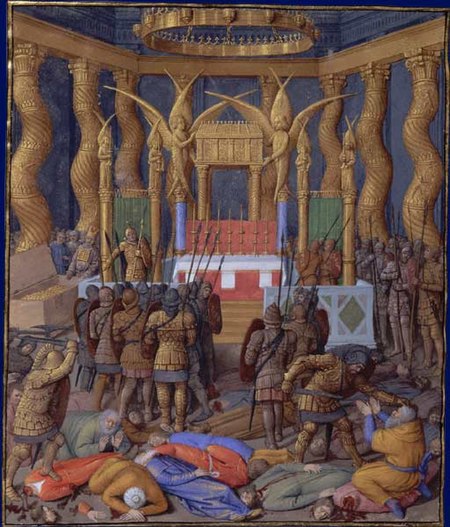Then Simeon blessed them and said to Mary, his mother: “This child is destined to cause the falling and rising of many in Israel, and to be a sign that will be spoken against, so that the thoughts of many hearts will be revealed. And a sword will pierce your own soul too.”
Luke 2:34-35
Before you read any further, take a look at this excellent Christmas commercial from the Dutch company Doc Morris:
Isn’t that a great ad?
When I watch it, I can’t help but think about Simeon. Like the man in the video, Simeon knew that someday he would rejoice to lift a precious child in his arms.
Unlike his female counterpart Anna, Simeon’s age is not given in Scripture.* But it’s likely that Simeon was an elderly man when the events of Luke 2 took place. The narrator reports that Simeon was “devout” and that he had been told by the Holy Spirit that he would remain alive until he saw the Messiah; this considered, some Orthodox Christians suggest that Simeon was a hundred years old at the moment described above.
I’ve always thought that older people have the best outlook on life. Sometimes that comes out in humor; it was George Burns who once quipped, “I’m so old that when I was a kid, the Dead Sea was just starting to get sick.” At other times, life experience presents as patience and perspective.
In all likelihood, Simeon and Anna had seen great hardships in their days. In 63 BCE – fewer than seventy years before the events described in Luke 2 – the Roman General Pompey had surrounded Jerusalem, assaulted the capital, and executed 12,000 of its residents.
It’s possible that these two senior saints were present when the Holy City was sacked. Was it this childhood trauma that sparked their hopes for “the consolation of Israel (Luke 2:25) and “the redemption of Jerusalem” (2:38)?

Simeon’s long-expected day arrived when Joseph and Mary brought Jesus to the temple to complete their purification rites and to commit the child to God. Many scholars believe that this ceremony – something like infant dedication – would have taken place when the child was 40 days old.
Moved by the Spirit, Luke says, Simeon went into the temple courts. When he saw the baby Jesus, he ran to him and held him up (all of that kettlebell work was worth it!).
And then Simeon began to sing.
I’m ready to go now, Lord, he said. I’ve seen your salvation!
This infant, the old man prophesied, would bring glory to the house of Israel (this was to be expected of a Jewish Messiah). On top of this, Simeon continued, Jesus would be a light unto to the Gentiles (this was the plot-twist, for Gentiles would include Romans like those who had smashed his city two generations before).
It was a glorious testimony: global, heartfelt, and inclusive. A lifetime of longing giving way to a sonnet of joy.
But then the tone of the old man’s words changed dramatically. Looking right at Mary, Simeon uttered something that I’d never dream of saying to a new mother (especially at a baptism service!):
“This child is destined to cause the falling and rising of many in Israel, and to be a sign that will be spoken against, so that the thoughts of many hearts will be revealed. And a sword will pierce your own soul too.”
Luke 2:34-35
Not your typical baby-shower chit-chat, is that? So what is Simeon talking about?
The lines about “rising and falling” are common themes in poems of Jewish expectation. We hear similar things in the Magnificat (Luke 1:46-55) and in many Old Testament passages (Proverbs 3:34; Isaiah 26:5; etc.).
But what’s with this stuff about “revealing the heart” and “piercing the soul”?
What Simeon seems to be describing is the way in which Jesus’ advent lays bare that which lives deep inside of people. When the Son of God enters the world, people’s inmost assumptions and strongest desires spill out.
Hypocrites get exposed. Thieves and tax collectors come clean. Lovers of money vote with their feet.
This is probably because in the person of Jesus, we see who we ought to be but can never become.
Jesus is our “pattern” as the old carol says. That can be inspiring; it can also be terrifying. (Maybe it’s both at once). But close contact with the Messiah forbids neutrality or disinterest.
Read on in the gospels. Watch and see. Close contact with the Perfect One causes some to panic and others to praise. Many will shout him down, a few will cling to his cloak.
But nobody can meet Jesus and be the same. Why? Because as Simeon says, Jesus reveals hearts.
The fact that Simeon adds the word “too” when speaking to Mary (“A sword will pierce your soul, too”) suggests to me that this line is the second half of a kind of parallelism. In other words, even Mary’s innermost thoughts and feelings will come pouring out. (Don’t forget, Mary was wont to ponder things in her heart; I don’t know, maybe she’s more of an introvert?)
But this is what swords do. When swords pierce things, what’s inside comes out. Slash a can of Coke and cola pours out. Hack at a watermelon and you get the fruit. Put a sword to a piñata and watch the candy fly.
And when swords pierce souls, passions come out.

To put it in overtly Christmas terms: When Jesus comes, what’s wrapped up gets opened up.
What pastors like me have long realized is that Christmas seems to do this to people. Cheerful people get cheerier. Grinchy people get grinchier. Discouraged people feel more discouraged.
That’s what we sense, at least.
But maybe the coming of Jesus doesn’t change people as much as it opens people. Maybe Christmas is when people let their guards down. When Jesus comes and dwells among people, they just quit with the act.
I have to think about this some more. But it sort of makes sense, doesn’t it? Those who are generally upbeat find new and beautiful reasons in Jesus to be glad at Christmas. Many who are bitter and unresolved will tell you that the Holidays annoy them. Lonely people see the beauty of Ultimate Connection and it becomes impossible to bury the emptiness anymore.
Some will rise, some will fall.
Given all that we’ve experienced together in 2020, let’s afford people that honesty. Let’s give one another the grace to make known the things that have been too long suppressed.
The outpouring of these dreams, doubts, and emotions could be a key indicator that Jesus himself is beginning his redemptive work in their hearts.
Merry Christmas,
Tim
*Anna is at least 84 years old, according to Luke, though there are ambiguities in the translation that make her exact age unclear.


